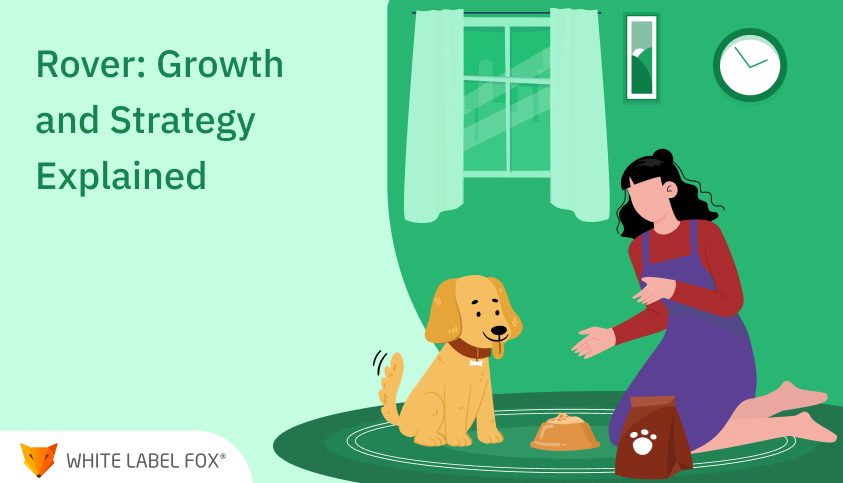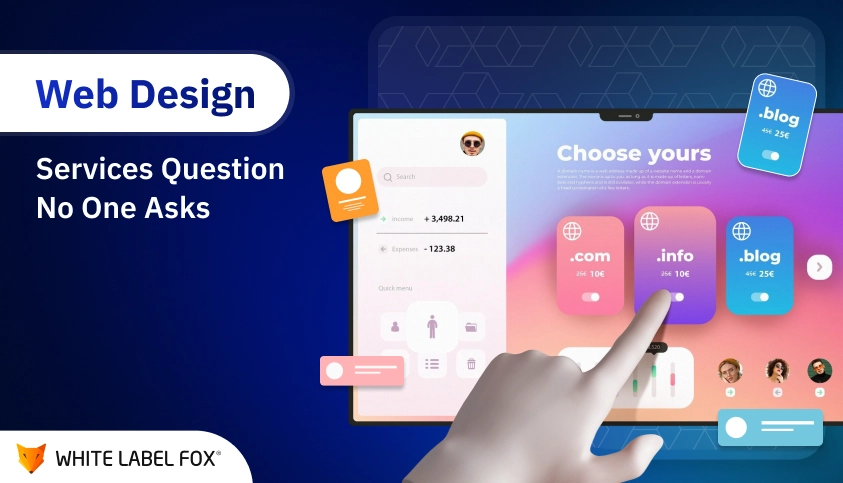There are days when you need to find someone to take care of your pets when you go on vacation or pay a neighbor to walk your dogs. Nowadays, mobile apps have made everything easier. There is a mobile app for booking taxis to appoint professionals to care for your pets.
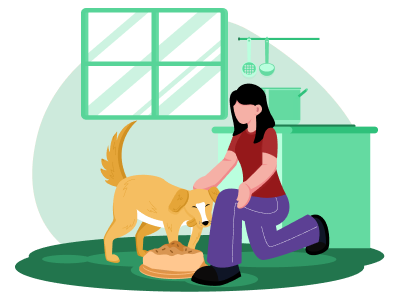
The US spent an average of 28 minutes in top pet-related apps in Q2 2022. The usage has increased by 73% from the previous average of 16 minutes recorded in 2021.
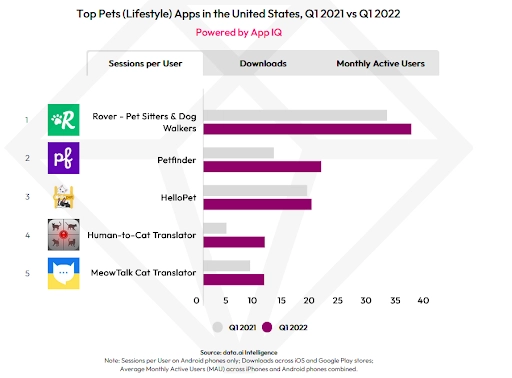
There is great demand for pet services like pet boarding and sitting. Increasing demand has made the Rover app popular in a subcategory, and the time spent on the pet care app has increased by 36 minutes during Q2 2022. Rover is followed by HelloPet, Petfinder, and others, respectively.
The pet care app makes life convenient for pet owners to find someone who can care for their lovely pets. However, the growing demand for pet care services has opened opportunities for successful endeavors. If you are thinking of building an app like Rover, having deep insight into the Rover business model, it’s working, and the revenue model can help you immensely.
Do you want to create a similar app but don’t know where to start? We’ve got you covered, so don’t worry. Here, we’ll talk about how to create a platform similar to Rover.
What is Rover?
Rover is an online marketplace and platform for pet care services. It connects pet owners with trusted pet caregivers, including pet sitters, dog walkers, and dog boarders. The platform allows pet owners to find, book, and manage various pet care services conveniently.
Rover enables pet owners to search for caregivers in their local area and browse through profiles to find the right match for their pet’s needs. The platform provides information about the caregivers, including their experience, reviews from previous clients, and availability. Pet owners can also communicate with caregivers, ask questions, and discuss specific requirements before booking a service.
Rover Success Timeline
Rover began its operations in Seattle, Portland, Oregon, and Washington. The company expanded its service in more than 50 states. The company is formally incorporated under the “A Place for Rover, Inc” name. Rover acts as a broker, taking around 20% of each transaction booked through the platform. Check details from start to end right below.
Founded: 13, 2011;
Founders: Philip Kimmey, Greg Gottesman, and Aaron Easterly
Headquarters: Seattle, Washington, U.S.
Area served: United States
Number of employees: 250+
Subsidiaries: DogVacay, Dog Buddy
Services: Pet sitting, Doggy daycare, Dog walking, Dog Boarding, Pet drop-ins
Website: rover.com
Rover, a dog-walking platform, was valued at $300 million in 2016. Many people walk dogs because their parents make them, due to their love, duty, and more. But more people these days do it for money as its core business is worth $1.35 billion.
In 2017, Rover acquired DogVacay in an all-stock deal. It represents that the total bookings on both websites amounted to $150 million. The company kept 20% in commission fees. The company later in 2018 announced its expansion into Europe.
Funding History and More Details to Know About Rover
In 2012 Rover secured funding led by Madrona Venture Group. The pet walking company secured more in 2013 from The Foundry Group. Petco announced an investment in the company; this partnership was for promotion with Petco’s website and stores in 2013.
Rover has raised almost $12 million in funding led by Madrona Venture Group, Menlo Ventures, The Foundry Group, and Petco in 2014. The company announced that Rover gained $25 million in funding from Technology Crossover Ventures in 2015.
In 2016, the pet care and dog walking platform received around $40 million in investments and another $65 million in 2017, led by Spark Capital. The pet care company raised around $155 million in funding in 2018.
Rover shares jump in trading debut after the platform goes public by merging with a Spac. The company has more than $270 million in capital to fund its business growth. The company shares are trading on Nasdaq under “ROVR” the ticker after merging with Nebula Caravel Acquisition Corp.
Rover Business Model: How Does a Pet Care Company Work?
Rover has transformed the pet care industry, smoothing the lives of owners and helping pet lovers generate significant profit. Grandview Research shows that the pet-sitting market size was estimated at 1.94 billion in 2021. The pet sitting market is estimated to increase 11.52% of the CAGR of 11.52% from 2022 to 2030.
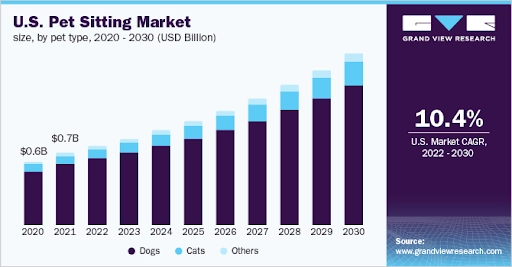
Many dog owners face it challenging to keep up with their pets all the time. But we all know that every limitation has its own sort of illusion. And this is where the Rover comes into the picture, which helps pet owners to care about their pets all the time in exchange for a few pennies.
The Rover business model enables platform users to buy as well as sell pet care services, including dog walking, pet sitting, dog boarding, house sitting, Doggy daycare, and Drop-in visits. Explore how Rover benefits its pet owners and service providers.
How Rover Benefits Pet Owners?
Rover benefits pet owners who may need pet care services due to work commitments, travel, or other reasons. It provides a convenient way to find trusted and reliable pet sitters, dog walkers, groomers, and other service providers.
People with busy work schedules can benefit from Rover by finding dog walkers or doggy daycare services. This allows them to ensure their pets receive regular exercise and attention even when they are occupied with work.
Individuals who frequently travel can use Rover to find pet sitters or boarding services. This way, they can ensure their pets are well-cared for and receive attention and care while they are away.
Rover can be particularly helpful for pet owners with special needs, such as medical conditions or behavioral issues. They can find service providers with experience and expertise in handling such situations.
If someone has multiple pets, finding reliable care for all of them can be challenging. Rover provides a platform where pet owners can find service providers who are comfortable and capable of caring for multiple pets at once.
How Rover Benefits Pet-Sitting Service Providers?
Individuals looking to provide pet care services as part-time or full-time jobs can benefit from Rover. It offers a platform to showcase their skills, connect with pet owners, and build their client base.
People who genuinely love animals can find joy in providing pet care services through Rover. It allows them to spend time with pets, care for them, and earn an income doing something they enjoy.
Rover operates on a two-sided marketplace business model, connecting pet owners with pet care providers. Check the Rover business model image to know more about the pet care platform.
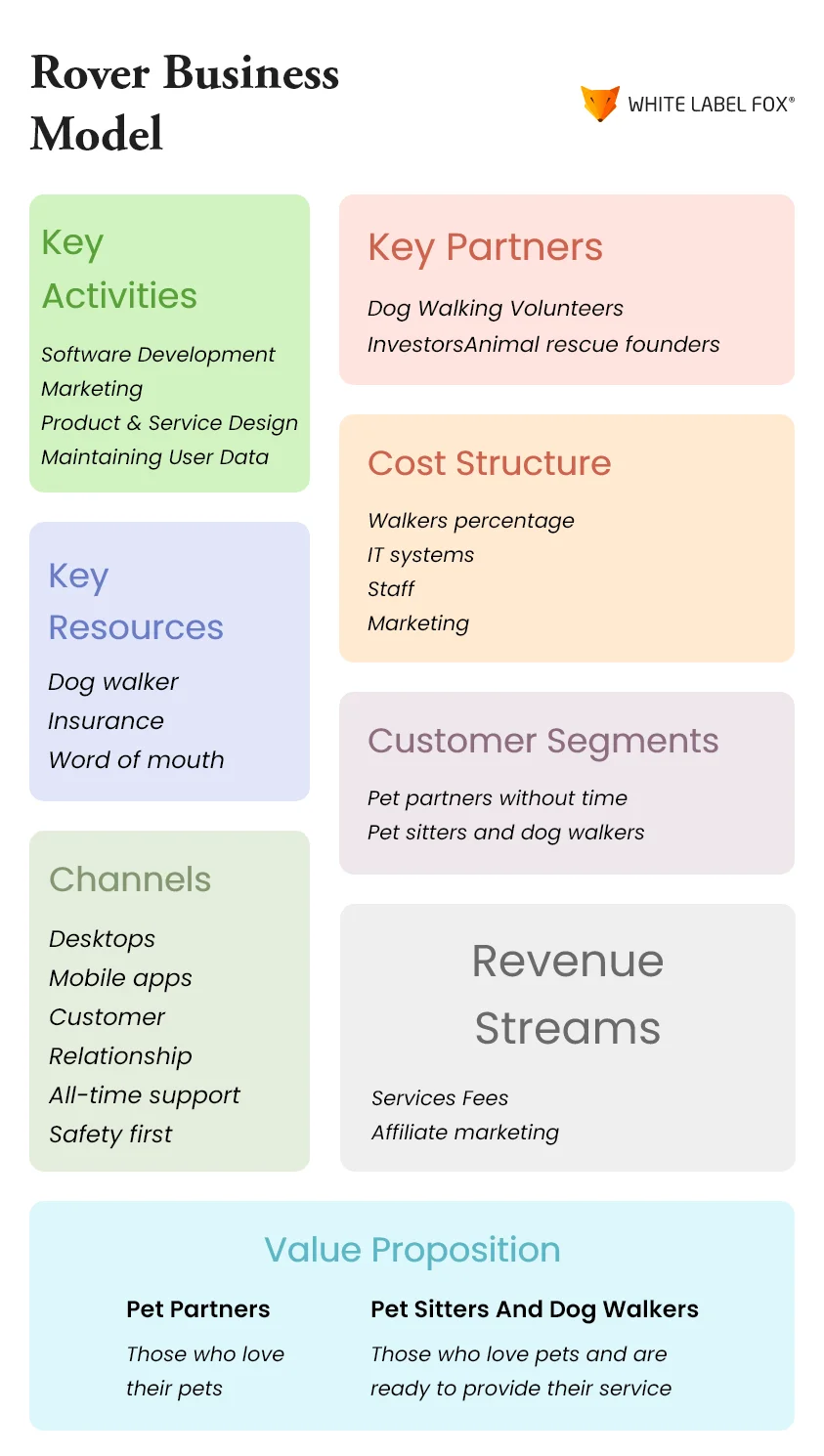
By operating as a trusted intermediary between pet owners and service providers, Rover has created a successful business model that leverages technology to streamline finding and booking pet care services, benefiting both pet owners and service providers.
How Does Rover Work?
Rover is a platform connecting pet owners with pet care service providers. Here’s a step-by-step overview of how Rover typically works: Pet owners and service providers need to create an account on the Rover platform. They provide necessary information such as their name, contact details, and preferences. Pet owners can search for specific services they require, such as pet sitting, dog walking, grooming, daycare, or boarding. They can enter their location and set filters to narrow down the search results.
Pet owners can view profiles of service providers that match their search criteria. Each profile includes details about the service provider’s experience, qualifications, availability, pricing, and reviews from previous clients.
Once a pet owner finds a suitable service provider, they can directly contact the provider through the platform’s messaging system. They can discuss service details, ask questions, and provide specific instructions regarding their pets’ care.
After the pet owner and service provider agree on the service terms, including the date, time, and duration of service, the pet owner can proceed to book the service through the platform. The booking is confirmed once the payment is made.
On the scheduled day, the pet owner brings their pet(s) to the service provider’s location or arranges for the service provider to visit their home. The service provider delivers the agreed-upon service, such as pet sitting, dog walking, grooming, or daycare, ensuring the pets’ well-being.
The pet owner and service provider can maintain communication throughout the service period through the Rover platform. The service provider can provide updates on the pets’ activities, send pictures or videos, and address any concerns or questions the pet owner raises.
Once the service is completed, the pet owner can leave a review and rating for the service provider on the Rover platform. This feedback helps build trust and assists future pet owners in selecting reliable service providers.
Rover handles the payment processing, deducting any applicable service fees or commissions from the pet owner’s payment. The service provider receives the payment for their services through the platform. By streamlining the process of finding, booking, and managing pet care services, Rover aims to make the experience convenient, secure, and reliable for both pet owners and service providers.
Rover Revenue Model: How Pet Care Platform Makes Money?
Rover has almost 3 million pet parents and 6,60,000 pet care service providers on its platform. The main source of revenue for Rover is service fees, besides the company mane money through various sources. Let’s check the Rover revenue model to find out how the company makes money.
Service Fees
Rover collects service fees on every booking made through the platform. The pet care platform collects 20 to 27%; this is combined service fees.
Pet partners need to pay around 5 to 7% of service fees of total bookings, whereas Pet care service providers need to pay about 15% to 20% of total bookings to the platform.
Revenue from Background Checks
Rover makes money by charging the pet care service providers to get a background check. This process is completed before allowing the service provider to work on the site.
The pet care platform has a large number of pet care service providers; each new provider who registers with the platform has to pay for a mandatory background check.
Two types of background checks from Rover include:
Basic: $10
Enhanced: $35
Selling Products
In addition to collecting money from background checks and service fees, the pet care platform makes money by selling its products. Pet owners can visit Rover Store to buy products like dog toys, collars, leashes, and more. Each product the company sells ranges between $3.50 to $224.99.
Affiliate Revenue
Rover also makes money through its affiliate revenue. Wondering how? Whenever users read blogs and click on links to purchase products. However, it’s not yet clear how much Rover receives per purchase.
Get Ready to Launch Your App Like Rover Today!
Rover’s two-sided marketplace business model has revolutionized the pet care industry by providing a convenient and trusted platform for pet owners and service providers. With a wide range of services, verified service providers, secure payment processing, and insurance coverage, Rover ensures a seamless and reliable experience for all involved.
Through its commission fees and potential additional revenue streams, Rover sustains its operations while benefiting both pet owners and service providers. The Rover business model has transformed the way people find and access quality pet care services, enhancing the well-being of pets and bringing peace of mind to their owners.
The Rover business model has proven successful in the pet care industry, and with the assistance of White Label Fox, aspiring entrepreneurs can leverage their white-label solutions to launch a similar business efficiently and effectively.
White Label Fox can provide a ready-made platform that can be customized to meet your business requirements of a pet care marketplace. This saves time and resources in building the technology infrastructure from scratch, allowing you to focus on other aspects of the business such as marketing, customer acquisition, and creating a service provider network.
Frequently Ask Questions
Rover is an online platform that connects pet owners with pet care
service providers, such as dog walkers, pet sitters, and other pet
care
professionals. It allows pet owners to find trusted care for their
pets
while they are away, whether for a few hours, days, or longer.
Rover works by allowing pet owners to search for local pet care
providers based on their location, services, and availability. Pet
owners can view profiles, read reviews, book services, and securely
pay
through the Rover app or website. Service providers, or "sitters,"
list
their services, set their rates, and are vetted by Rover before they
are
allowed to take bookings.
Rover offers a variety of pet care services, including:
- Dog Walking: Professional dog walkers who take dogs
on
regular walks.
- Pet Sitting: In-home pet sitting for pet owners going
on
vacation or leaving their pets for extended periods.
- Boarding: Overnight stays at a sitter's home for pets
while their owners are away.
- Doggy Day Care: Daytime care for pets while their
owners
are at work or otherwise unavailable.
- Drop-in Visits: Short visits to check in on pets,
feed
them, or give them some attention during the day.
- Dog Walking: Professional dog walkers who take dogs on regular walks.
- Pet Sitting: In-home pet sitting for pet owners going on vacation or leaving their pets for extended periods.
- Boarding: Overnight stays at a sitter's home for pets while their owners are away.
- Doggy Day Care: Daytime care for pets while their owners are at work or otherwise unavailable.
- Drop-in Visits: Short visits to check in on pets, feed them, or give them some attention during the day.
Rover follows a marketplace business model. It connects pet owners
with
service providers, facilitating the exchange of services. Rover
charges
a service fee for each booking, and pet care providers set their own
rates. The company generates revenue by taking a percentage (usually
15%) of each transaction, depending on the service.
Rover generates revenue in the following ways:
- Service Fees: Rover takes a commission from each
booking
made on the platform.
- Premium Features: Rover offers additional premium
services such as Rover Cards (insurance for pet care
services),
and subscription-based services like Rover Guarantee for
extra
protection.
- Advertising: Rover may generate revenue from
advertising
or partnering with pet product companies on its platform.
- Service Fees: Rover takes a commission from each booking made on the platform.
- Premium Features: Rover offers additional premium services such as Rover Cards (insurance for pet care services), and subscription-based services like Rover Guarantee for extra protection.
- Advertising: Rover may generate revenue from advertising or partnering with pet product companies on its platform.
Rover's growth strategy revolves around:
- Expanding Market Reach: Rover continues to expand its
services to new cities, making it available in more regions
for
pet owners and sitters alike.
- Building Trust: Rover invests heavily in building
trust
with both pet owners and service providers through vetting,
insurance, and transparent user reviews.
- Marketing and Partnerships: The company uses digital
marketing and partnerships with pet brands to drive brand
awareness and attract new users.
- Mobile App Innovation: Rover enhances its mobile app
experience for seamless booking, payments, and customer
interaction, boosting user retention and satisfaction.
- Expanding Market Reach: Rover continues to expand its services to new cities, making it available in more regions for pet owners and sitters alike.
- Building Trust: Rover invests heavily in building trust with both pet owners and service providers through vetting, insurance, and transparent user reviews.
- Marketing and Partnerships: The company uses digital marketing and partnerships with pet brands to drive brand awareness and attract new users.
- Mobile App Innovation: Rover enhances its mobile app experience for seamless booking, payments, and customer interaction, boosting user retention and satisfaction.
Rover differentiates itself in several ways:
- Wide Range of Services: Rover offers more variety
than
traditional pet care services, providing options like pet
boarding, dog walking, and daycare, all in one place.
- Vetting Process: Rover has a thorough vetting process
for
its service providers, including background checks, and
offers
safety features like insurance to build trust with pet
owners.
- Mobile Convenience: Rover's app makes booking and
managing pet care services incredibly easy, offering
real-time
updates for pet owners while their pets are in care.
- Wide Range of Services: Rover offers more variety than traditional pet care services, providing options like pet boarding, dog walking, and daycare, all in one place.
- Vetting Process: Rover has a thorough vetting process for its service providers, including background checks, and offers safety features like insurance to build trust with pet owners.
- Mobile Convenience: Rover's app makes booking and managing pet care services incredibly easy, offering real-time updates for pet owners while their pets are in care.
Rover ensures the safety of pets by:
- Background Checks: All service providers undergo
background checks, including criminal history, to ensure
trustworthiness.
- Rover Guarantee: Offers liability coverage for
accidents
or damages during a pet sitting or walking session.
- Insurance: Rover provides pet insurance for pet care
services, offering additional protection for both pet owners
and
pet care providers.
- Real-Time Updates: Pet owners receive updates,
photos,
and GPS tracking while their pets are in care, ensuring
peace of
mind.
- Background Checks: All service providers undergo background checks, including criminal history, to ensure trustworthiness.
- Rover Guarantee: Offers liability coverage for accidents or damages during a pet sitting or walking session.
- Insurance: Rover provides pet insurance for pet care services, offering additional protection for both pet owners and pet care providers.
- Real-Time Updates: Pet owners receive updates, photos, and GPS tracking while their pets are in care, ensuring peace of mind.
Rover faces several challenges, including:
- Competition: Rover competes with other pet care
platforms
like Wag! and traditional pet care providers.
- Quality Control: Maintaining consistent quality
across
all service providers can be difficult, especially with a
large
network of sitters and walkers.
- User Trust: Building and maintaining trust between
pet
owners and service providers is essential, as pet owners are
entrusting others with their pets' well-being.
- Regulation: As the pet care industry grows,
regulatory
challenges may arise, especially concerning the
certification
and qualification of pet care providers.
- Competition: Rover competes with other pet care platforms like Wag! and traditional pet care providers.
- Quality Control: Maintaining consistent quality across all service providers can be difficult, especially with a large network of sitters and walkers.
- User Trust: Building and maintaining trust between pet owners and service providers is essential, as pet owners are entrusting others with their pets' well-being.
- Regulation: As the pet care industry grows, regulatory challenges may arise, especially concerning the certification and qualification of pet care providers.
To start a business like Rover, consider the following:
- Build a Reliable Platform: Develop a robust online
platform (website and mobile app) that allows pet owners to
find
and book trusted pet care providers.
- Vet Providers: Implement a thorough vetting process,
including background checks, interviews, and training for
service providers to ensure safety.
- Market Your Service: Use digital marketing
strategies,
including SEO, social media, and partnerships with pet
brands,
to attract users to your platform.
- Create a Revenue Model: Like Rover, you can generate
revenue through booking fees, service commissions, and
offering
premium services to pet owners and providers.
- Build a Reliable Platform: Develop a robust online platform (website and mobile app) that allows pet owners to find and book trusted pet care providers.
- Vet Providers: Implement a thorough vetting process, including background checks, interviews, and training for service providers to ensure safety.
- Market Your Service: Use digital marketing strategies, including SEO, social media, and partnerships with pet brands, to attract users to your platform.
- Create a Revenue Model: Like Rover, you can generate revenue through booking fees, service commissions, and offering premium services to pet owners and providers.

